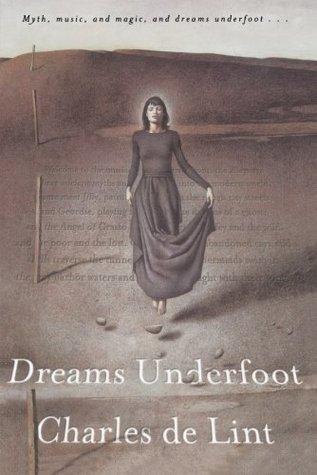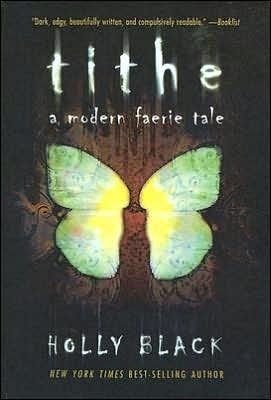Received: Library
Publication Date of Book: October 2004
Stars: 4/5
Official Summary:
Seventeen-year-old Imogene's tough, rebellious nature has caused her more harm than good -- so when her family moves to Newford, she decides to reinvent herself. She won't lose her punk/thrift-shop look, but she'll try to avoid the gangs, work a little harder at school, and maybe even stay out of trouble for a change.Maxine is Imogene's exact opposite. Everyone considers Maxine a straight-A loser, but as Imogene soon learns, it's Maxine's overprotective mother whose rules about clothes and curfews make it impossible for her to speak up for her true self. Oddly, the friendship works. Imogene helps Maxine loosen up, and in turn, Maxine keeps Imogene in line.
But trouble shows up anyway. Imogene quickly catches the eye of Redding's A-list bullies, as well as the school's resident teen ghost. Then she gets on the wrong side of a gang of malicious fairies. When her imaginary childhood friend Pelly shows up, Imogene realizes that the impossible is all too real -- and all too dangerous. If she wants to survive high school -- not to mention stay alive -- she has to fall back on the skills she picked up in her hometown. Even with Maxine and some unexpected allies by her side, will she be able to make it?
My Thoughts:
"The thing to remember when you're writing," he said, "is, it's not whether or not what you put on paper is true. It's whether or not it wakes a truth in your reader. I don't care what literary devices you might use, or belief systems you tap into -- if you can make a story true for a reader, if you can give them a glimpse into another way of seeing the world, or another way that they can cope with their problems, then that story is a success."
Previous to my picking up this novel, I had no idea who Charles de Lint was, let alone that he was a winner of the World Fantasy Award. In fact, he is something of an urban fantasy/mythic fiction legend! The Blue Girl is part of an extensive series with quite a few loosely collected standalone novels set in the same North American city called Newford. While I didn't read any of them previously to The Blue Girl, I found myself perfectly in sync with the story and easily able to understand everything that was thrown at me!
YA fantasies are hands down my all time favorite genre to read. However, it's rare the I actually ever find myself reading one, which I find more than weird. (I'm just a weird person, though!) As a result, de Lint's novel was a welcoming breath of fresh air. For one, The Blue Girl had a strong female friendship element that I feel I've never encountered before. Imogene and Maxine were complete opposites, yet they fit together perfectly. Maxine was the nerdy girl, unwillingly living on the outside of the social hierarchy, forced to always be looked over and shunned. Imogene was the willingly outrageous one who made a statement everywhere she went and by everything she did, including her sudden words, bold actions, and even out-there fashion sense. She was certainly a one of a kind. This dynamic duo, though, was able to bring out the best in each other and appreciate their unique individuality. Just like the mistake that many of us make, their peers judged them by their basic sense of sight. However, Maxine and Imogene understood that differences are nothing but just that, and they realized that they shouldn't judge one another by them. Outward appearances can be quite deceiving and are hardly part of a person's entire story.
The author was able to establish a sincere, quirky friendship that was utterly phenomenal and almost impossible to describe! I loved how Imogene decided to approach Maxine for the first time because of Maxine's undesirable pariah status. I also loved how they didn't try to pry into each others' lives (especially because Maxine knows so little about Imogene's past struggles and "bad girl" reputation), but instead realized that they needed to trust each other and have patience. They both knew that sometimes people need time to open up about themselves and their pasts, a significant point that strongly stood out to me, because truly trusting and waiting for someone does not happen often. (On a quick note, The Blue Girl also had amazing family dynamics (one hippie and loose, one staunch and strict), which the reader is able to see grow, especially for one particular character!) The friendship and familial bonds in this book were downright phenomenal!
When first meeting Imogene, I was intrigued by her. She's one of those people who naturally carries an aura of awe and mystery. Her more hardcore past was something she wanted to put behind her. She wasn't going to let anything define who she was. That's why moving to Newford was so significant for her. It was a fresh start, a way to reinvent parts of herself. However, she was never going to forget what happened before because she knew it was an essential part to her life story. Nothing was going to hold her back, however, even if it was her own reputation. I loved how this was her own decision and not something that another person forced her to do. This brings me back to Maxine, who played a significant part in opening Imogene's eyes and shaping her view in a subtle, barely noticeable way, which was heartwarming to see unfold. Despite this being a fantasy novel with mischievous fairies, suddenly all too real imaginary friends, lonely ghosts, and an impending darkness, de Lint took great care in shaping his characters when he could have focused his full attention on the fantastical elements themselves.
-Mr. Riddell
The Blue Girl
YA fantasies are hands down my all time favorite genre to read. However, it's rare the I actually ever find myself reading one, which I find more than weird. (I'm just a weird person, though!) As a result, de Lint's novel was a welcoming breath of fresh air. For one, The Blue Girl had a strong female friendship element that I feel I've never encountered before. Imogene and Maxine were complete opposites, yet they fit together perfectly. Maxine was the nerdy girl, unwillingly living on the outside of the social hierarchy, forced to always be looked over and shunned. Imogene was the willingly outrageous one who made a statement everywhere she went and by everything she did, including her sudden words, bold actions, and even out-there fashion sense. She was certainly a one of a kind. This dynamic duo, though, was able to bring out the best in each other and appreciate their unique individuality. Just like the mistake that many of us make, their peers judged them by their basic sense of sight. However, Maxine and Imogene understood that differences are nothing but just that, and they realized that they shouldn't judge one another by them. Outward appearances can be quite deceiving and are hardly part of a person's entire story.
The author was able to establish a sincere, quirky friendship that was utterly phenomenal and almost impossible to describe! I loved how Imogene decided to approach Maxine for the first time because of Maxine's undesirable pariah status. I also loved how they didn't try to pry into each others' lives (especially because Maxine knows so little about Imogene's past struggles and "bad girl" reputation), but instead realized that they needed to trust each other and have patience. They both knew that sometimes people need time to open up about themselves and their pasts, a significant point that strongly stood out to me, because truly trusting and waiting for someone does not happen often. (On a quick note, The Blue Girl also had amazing family dynamics (one hippie and loose, one staunch and strict), which the reader is able to see grow, especially for one particular character!) The friendship and familial bonds in this book were downright phenomenal!
When first meeting Imogene, I was intrigued by her. She's one of those people who naturally carries an aura of awe and mystery. Her more hardcore past was something she wanted to put behind her. She wasn't going to let anything define who she was. That's why moving to Newford was so significant for her. It was a fresh start, a way to reinvent parts of herself. However, she was never going to forget what happened before because she knew it was an essential part to her life story. Nothing was going to hold her back, however, even if it was her own reputation. I loved how this was her own decision and not something that another person forced her to do. This brings me back to Maxine, who played a significant part in opening Imogene's eyes and shaping her view in a subtle, barely noticeable way, which was heartwarming to see unfold. Despite this being a fantasy novel with mischievous fairies, suddenly all too real imaginary friends, lonely ghosts, and an impending darkness, de Lint took great care in shaping his characters when he could have focused his full attention on the fantastical elements themselves.
Before I go any further into my review, I just want you to know that I thoroughly enjoyed this book but had several issues with it that I'm going to bring up. However, these points didn't break the novel for me but left me thinking about them for awhile after I had put it down. As a result, I feel a strong need to elaborate on them. You should definitely still read his books, though, because this one was fabulous!
Charles de Lint has this strange ability to draw you into his story with fairly simple, quick writing and stunning characterization. He doesn't waste time on useless descriptions or unnecessary plot points. He gets down to it, and does it well. There were these creepy scenes in which eerie, grotesque fairies marched out of a closet in the middle of the night to a disturbing symphony of music, which immediately gave me goosebumps. At the end, though, when the murderous antagonists were confronted, I believed that this would have been the most terrifying high point for the girls, but it felt much less alarming than the previously described scene. (I can't help but feel as if this shouldn't have been the case, and it was almost as if the scenes' tones were reversed. As a result, the climax felt a little wrong, too.) I also felt like it was too easy for the antagonists to be defeated, and even though there was so much suspense leading up to it, the entire event fell flat. When we finally got there, all of the tension quickly fizzled out. It was almost like it was never even there to begin with. Unfortunately, I considered it all very anticlimactic and abrupt.
I also would have loved to see Imogene's relationship with her boyfriend fleshed out further. For me, it was a sudden, "BLAM! Here's another character!" It all felt very quick, especially because he was such a small character in regards to the whole scheme of things. On the other hand, I loved how de Lint delved into Maxine's romantic life. This felt much more realistic. (I really liked the pairing! It was so cute!)
All in all, The Blue Girl was a heartwarming story with amazing themes and strong relationships that I have rarely encountered before. Spunky characters run rampant and more than a little mischief goes on within the pages. Sure, I had a couple of issues with it, but I have found a new series and an author that I will gladly explore in the future! Now, onward to the rest of the series!
If you liked this book, you may also enjoy:




